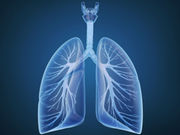Increased risk of all-cause mortality seen in four separate research cohorts
WEDNESDAY, Feb. 17, 2016 (HealthDay News) — Interstitial lung abnormalities correlate with increased risk of all-cause mortality, according to research published in the Feb. 16 issue of the Journal of the American Medical Association.
Rachel K. Putman, M.D., from the Brigham and Women’s Hospital in Boston, and colleagues examined whether interstitial lung abnormalities are associated with increased mortality in four prospective cohort studies. Data were included for 2,633 participants from the Framingham Heart Study (FHS); 5,320 from the Age Gene/Environment Susceptibility (AGES)-Reykjavik Study; 2,068 from the Chronic Obstructive Pulmonary Disease (COPD)Gene study; and 1,670 from the Evaluation of COPD Longitudinally to Identify Predictive Surrogate Endpoints (ECLIPSE) study. The authors examined all-cause mortality during a median follow-up of about three to nine years.
The researchers found that 7, 7, 8, and 9 percent of participants from FHS, AGES-Reykjavik, COPDGene, and ECLIPSE, respectively, had interstitial lung abnormalities. More deaths were seen among participants with, versus those without, interstitial lung abnormalities in FHS, AGES-Reykjavik, and ECLIPSE. Interstitial lung abnormalities correlated with increased risk of death in the FHS, AGES-Reykjavik, COPDGene, and ECLIPSE cohorts after adjustment for covariates (hazard ratios, 2.7, 1.3, 1.8, and 1.4, respectively). The higher rate of mortality seen in the AGES-Reykjavik cohort was attributed to a higher rate of death due to respiratory diseases, particularly pulmonary fibrosis.
“The clinical implications of this association require further investigation,” the authors write.
Several authors disclosed financial ties to the pharmaceutical and medical device industries.
Copyright © 2016 HealthDay. All rights reserved.








